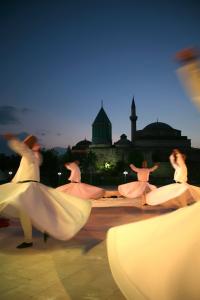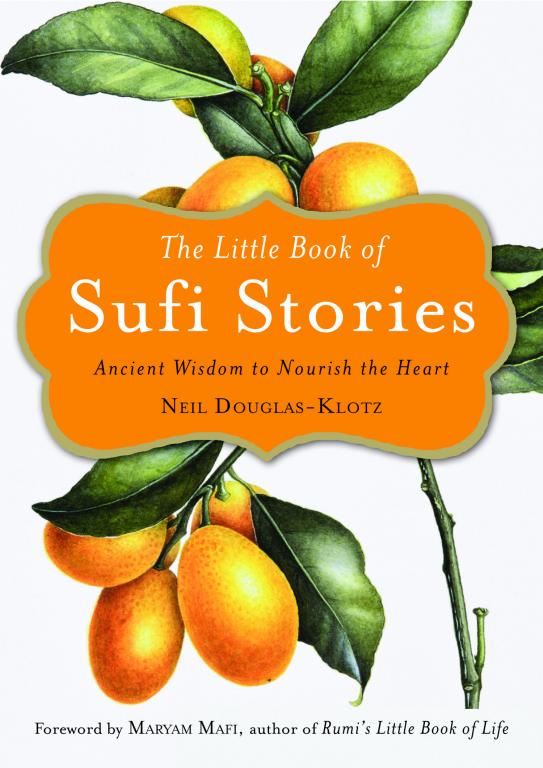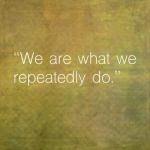Today’s guest post is by Neil Douglas-Klotz, author of The Little Book of Sufi Stories.

What’s the story with Sufis today?
Sufis, usually called the mystics of Islam, are best known in the West through the popular love poetry of Jelaluddin Rumi, the 13thcentury Persian mystic.
Yet an internet search of “Sufi news” over the past year reveals that Sufis are just as present today as they were eight centuries ago and are playing a major role in the culture wars and political struggles within Islam around the world.
- In Tunisia, women are guarding Sufi shrines, forty of which have been destroyed by fundamentalists in the past five years.
- In Bangladesh, Sufi bloggers have been targeted and assassinated by fundamentalists, who accuse them of heresy. Some Sufi groups there have formed their own political parties and sit in parliament to protect their interests.
- The Supreme Council of Sufi Orders in Egypt backed the re-election of President Abdel Fattah al-Sisi in recent elections in the hope that he would protect them from jihadist groups.
- In Morocco, the government of King Mohammed VI officially supports the Sufi orders and shrines in order to promote the values of love and harmony and, in his words, to“block radicalism and terrorism.”
- In Pakistan, where a number of Sufi shrines have been attacked in recent years, a major news media headline recently read “Can Sufi gatherings change extremist mindsets?
- In India, a major pop music movement called “Sufiana” aims to promote peace and harmony melding traditional and modern musical styles.
I could go on, but you probably get the idea. These stories escape the mainstream media in the West, which consciously or unconsciously tends to promote the view of Islam as monolithic, uncompromising and dangerous. It is anything but this. In reality, Islam is as diverse as any religion on the planet today, and dividing it simplistically between fundamentalists and modernizers or liberals and conservatives oversimplifies a very complex reality.
Sufism, the “Soul of Islam”
In my forty-year association with and study of various Sufis around the world, I found that many of them feel that they are the “soul of Islam,” and that Islam has been stolen from them. According to the Tunisian president of the Islamic World Union of Sufism, Shaykh Mazen Cherif, “We don’t think of our way of worshipping and remembering God as Sufism or mysticism, it is just Islam. Sufism here unites, it doesn’t divide.”
For centuries, it was the same in most of the Islamic parts of the world. This only began to change in the latter half of the 20thcentury, a process chronicled in Karen Armstrong’s book The Battle for God; Fundamentalism in Judaism, Christianity and Islam. Community service, scientific exploration, cultural harmony and a high tolerance for paradox and diversity have typified the hundreds of Sufi movements and groups worldwide ever since individual Muslims — women and men — began to form loose organizations in the 10thcentury.
Besides the poetry of Rumi, some people recognize Sufi music, like that of the late Nusrat Fateh Ali Khan, or the graceful ritual of the Turkish Mevlevi or “whirling” dervishes. Not all Sufis use poetry, music or dance-like ritual, of course. But virtually all use “teaching stories,” which is why I undertook to re-tell some of these stories for the 21stcentury. Nowhere else can one find the Sufi ethos of tolerance for diversity as well as wisdom about how to live with it so elegantly conveyed.
Why Sufism Matters
 We have so many things to engage our attention these days: 24-hour rolling news, social networks, streaming videos and multiplex films. You might ask: is there any room left for the humble Sufi story? Allow me to make the case.
We have so many things to engage our attention these days: 24-hour rolling news, social networks, streaming videos and multiplex films. You might ask: is there any room left for the humble Sufi story? Allow me to make the case.
First, let’s deal with our culture’s obsession with news and “facts.” As the great American storyteller Mark Twain once said, there are three categories of untruth: lies, damn lies and statistics. As we experience every day, different people see and remember different things. Even video can be edited and altered.
As distinguished from facts, alternative facts and news (fake or otherwise), the Sufi story presents us with something else: true fiction. These timeless stories reveal something very deep about the way we experience and create different realities out of the stuff of life. Like life, characters in these stories appear and disappear for no apparent reason, the good are not always rewarded, and the evil are not always punished. No trigger warnings occur.
Many of the best stories simply mirror back to us our own absurd habits of thought. Some stories are long, some little better than one-liners. For instance:
The wise fool Mullah Nasruddin was often losing his donkey. Once while he was looking for it, he was walking through town, singing and giving thanks to God.
“Why are you so joyful, Mullah?” his friends asked him. “We thought you had lost your favorite donkey.”
“I did, friends,” responded Mullah. “But at least I wasn’t riding it at the time. If I had been, I would be lost, too!”
As to our engagement with the entertainment industry, the Sufi story cannot, of course, compete with the special effects of the digital age. But a Sufi teacher telling a story never sets out to simply perform or entertain. Each telling of a story is unique and creates a spontaneous community. Within this community, the storyteller must respond to the moment, not give a rehearsed performance.
Learning by “Unlearning”
Traditionally, when mystics and students gather, the teacher intersperses a story with a spiritual practice or meditation that could lead them all to the doorway of an experience that illuminates an unhelpful pattern of thought or behavior, a process that Sufis call “unlearning.” With enough unlearning, a person could actually become a human being, they say.
Yet if mere self-improvement were the goal, why tell stories when we have so many valuable self-help methods to transform our lives? The further we go into the “self,” however, the more we find that logical systems don’t help very much. Most of our human life doesn’t obey even the most complex algorithms that artificial intelligence can conceive (witness the quixotic ups and downs of the stock market if you doubt this).
When a Sufi tells a story, no PowerPoint is used, no bullet-pointed thought-nuggets are conveyed to be studiously notated. These stories cannot be diced, sliced, parsed or interpreted for their metaphoric or allegorical meaning. In fact, if you tell a Sufi story well, to interpret it would kill it. If I tell you that such and such a character means this, the bird is the soul, the donkey is our ego… blah blah blah. It’s all nonsense.
Like a Zen koan, a real Sufi story allows a person’s innate wisdom to arise from the inside. And wisdom (unlike its poor cousin, the fact or supposed fact) cannot be given like a pill to the merely rational, cognitive side of our minds. That part of our mind—useful in many situations—fixates on a supposed meaning, ideal or principle, then strolls away very happily, completely unchanged in its depths.
In those depths lie all the important feelings, inklings, habits and passions that control most of our lives. When only the modern, surface part of our hearts and minds gets involved, even a story told by a Buddha can turn into a tale heard by an idiot, signifying nothing.
Rather than add to our storehouse of learned information or facts, these stories can help us break down the mental-emotional patterns that keep us from feeling as free and fulfilled as we might. In a moment, a Sufi story can offer a hah?that changes into an aha!We may then find ourselves in a different inner world, less controlled yet richer, more like wild nature.
As Rumi says:
The inner being of a
human being
is wild nature, a jungle.
If you are aware of yourself as
part of the divine breath,
be very aware
when you travel inside.
In this sense, these stories function almost exactly opposite to the computer algorithms of social media, which feed back to us things that reinforce what we already like (or think we like).
Finally, as the German novelist and storyteller Hermann Hesse once wrote, the great stories of humanity—like fairy tales, Hasidic stories, Celtic stories, Zen stories and Sufi stories—provide us with incomparable examples of the “genetic history of the soul.” We share this depth of soul with all human beings. So hearing, reading and telling all these stories, while “not news,” can help bring us closer together, re-creating our all-too-fragile sense of human community.
Neil Douglas-Klotz is the author of The Little Book of Sufi Stories, as well as the bestselling Sufi Book of Life. He has also written books on the Aramaic words of Jesus, including The Hidden Gospel and Prayers of the Cosmos.
Enjoy reading this blog?
Click here to become a patron.














